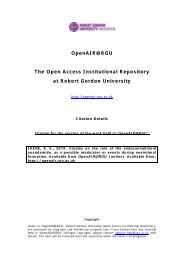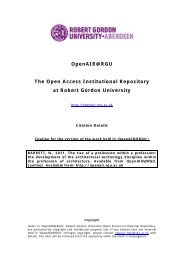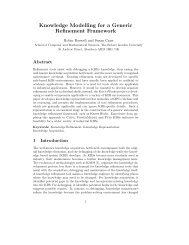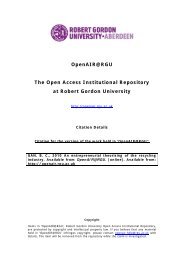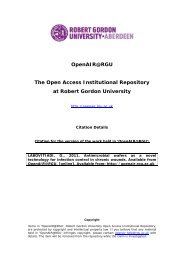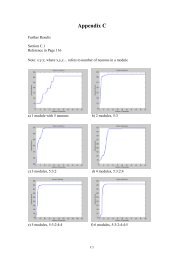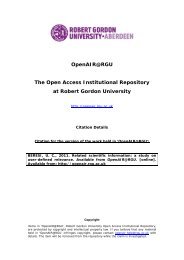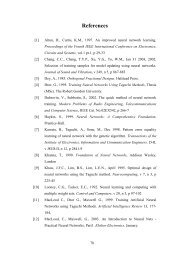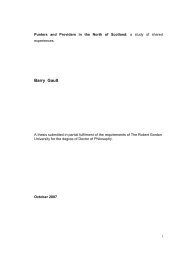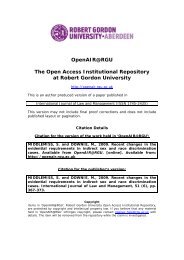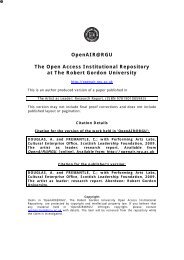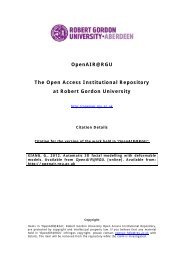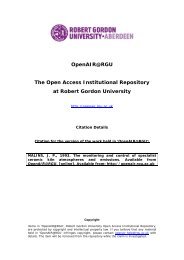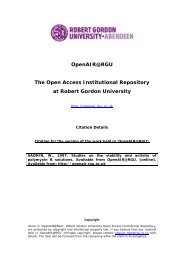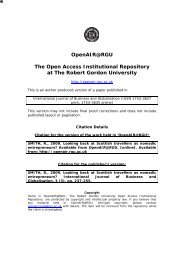- Page 1: OpenAIR@RGUThe Open Access Institut
- Page 5: AcknowledgementsI would like to war
- Page 8 and 9: 6.2.2 Narrative themes from Tina’
- Page 10 and 11: 8.5 Career? Not for now thanks! 288
- Page 12 and 13: List of FiguresFigure 1: Women in t
- Page 14 and 15: Introduction(i) Women in the workpl
- Page 16 and 17: Consequently, feminism has been asc
- Page 18 and 19: Chapter six describes the first set
- Page 20 and 21: The Treasury's staffing policies re
- Page 22 and 23: which accounted for 6.3 per cent of
- Page 24 and 25: highlights the negative impact bear
- Page 26 and 27: THE ORGANISATION’S PERSPECTIVE1.5
- Page 28 and 29: taken. Again, the media’s reflect
- Page 30 and 31: est, often perceived restrictive fl
- Page 32 and 33: other words, although processes and
- Page 34 and 35: Empowering women through the game o
- Page 36 and 37: of reports as new statistics are re
- Page 38 and 39: certain types of organisations. Or,
- Page 40 and 41: espect to the need to leave the job
- Page 42 and 43: the disclosure of pregnancy, as des
- Page 44 and 45: outside of work. Re-framing is nece
- Page 46 and 47: work-life balance concerns is consi
- Page 48 and 49: time” (1996 p. 6). This definitio
- Page 52 and 53: the alternative view is that uncert
- Page 54 and 55: satisfying the demands of the id an
- Page 56 and 57: esearch neglects a “whole person
- Page 58: worker - and is as available to man
- Page 61 and 62: preference suggestion, i.e.: women
- Page 63 and 64: theory as agency is particularly im
- Page 65 and 66: degree of agency is restricted in m
- Page 67 and 68: And at worst, a way of reducing exp
- Page 69 and 70: however, the following extreme (con
- Page 71 and 72: the Chicago School of Sociology, wh
- Page 75 and 76: Pattern 5:maternity leave transitio
- Page 77 and 78: Chapter 3Feminist psychology and ca
- Page 79 and 80: etter understanding of dynamics at
- Page 81 and 82: 3.4 Post-modern/post-structuralist
- Page 83 and 84: • Everything we perceive, includi
- Page 85 and 86: Chapter 4MethodologyIt is frequentl
- Page 87 and 88: framework from which to conduct cro
- Page 89 and 90: simplification as the telling of an
- Page 91 and 92: interviewees’ words and story for
- Page 93 and 94: Socio-linguistic level of analysis
- Page 95 and 96: 4.7.3 What is Interpretative Phenom
- Page 97 and 98: Long or shortinterviewsOne off inte
- Page 99 and 100: 4.9 Validity of IPA to the research
- Page 101 and 102:
in the literature review, whilst th
- Page 103 and 104:
Islands who had been on the island
- Page 105 and 106:
Table 3 Summary of participants.Pse
- Page 107 and 108:
agency within social structures, (G
- Page 109 and 110:
on the first part of the first inte
- Page 111 and 112:
a final opportunity to add any othe
- Page 113 and 114:
un-related individuals. No previous
- Page 115 and 116:
The eventual decision to end my fac
- Page 117 and 118:
The questions sought to understand
- Page 119 and 120:
Reflection: This time, I felt much
- Page 121 and 122:
At this point it was also possible
- Page 123 and 124:
later linked to reference to an ove
- Page 125 and 126:
part of the analytical process, it
- Page 127 and 128:
circumstances and professional code
- Page 129 and 130:
in the very least, offer some trans
- Page 131 and 132:
Chapter 6T1 Findings*PINS = Particu
- Page 133 and 134:
6.2 Case study 1: Tina - three halv
- Page 135 and 136:
6.2.1 Summary of Tina’s Lived and
- Page 137 and 138:
Tina inferred her end of university
- Page 139 and 140:
Theme 2: Conflicting needs: managin
- Page 141 and 142:
associated with resolving this conf
- Page 143 and 144:
a family, the reality was that Tina
- Page 145 and 146:
6.2.1 Summary of Martha’s Lived a
- Page 147 and 148:
working was strongly expressed agai
- Page 149 and 150:
Her next job at a branch of a large
- Page 151 and 152:
Martha believed strongly she had le
- Page 153 and 154:
she ended the interview. The story
- Page 155 and 156:
6.4.1 Summary of Sasha’s lived an
- Page 157 and 158:
heard of that before, and I said, l
- Page 159 and 160:
Not having a goal therefore is cont
- Page 161 and 162:
Theme 4: Importance of variety, ind
- Page 163 and 164:
She had a pierced tongue, yet offer
- Page 165 and 166:
6.5.1 Summary of Connie’s Lived a
- Page 167 and 168:
6.5.2 Narrative Themes for Connie
- Page 169 and 170:
They [her employers] were so flexib
- Page 171 and 172:
Well, she’d erm, come down and tr
- Page 173 and 174:
You can’t object to anybody wanti
- Page 175 and 176:
6.6 Case Study 5: Summer - beautici
- Page 177 and 178:
6.6.2 Narrative Themes from Summer
- Page 179 and 180:
as a female in a male-dominated pro
- Page 181 and 182:
6.6.3 Summary comment on thematic a
- Page 183 and 184:
6.7 Case Study 6: Heather - distres
- Page 185 and 186:
“and I got six months full pay wh
- Page 187 and 188:
to make a big deal out of it, you
- Page 189 and 190:
einforced by a friend’s experienc
- Page 191 and 192:
Her story at this point described h
- Page 193 and 194:
ut she was like: no you don’t hav
- Page 195 and 196:
6.8 T1 (Time 1) IPA findings.Interp
- Page 197 and 198:
6.9 T1 Master theme: a woman in a m
- Page 199 and 200:
workwomen meansso I got a job at er
- Page 201 and 202:
Role conflict, which was only ever
- Page 203 and 204:
with organisations.them to be good
- Page 205 and 206:
First maternity leave - clearbounda
- Page 207 and 208:
6.13 Master theme: disillusionment
- Page 209 and 210:
6.13 T1 master theme: disillusionme
- Page 211 and 212:
6.14 T1 master theme: self-developm
- Page 213 and 214:
Table 17 T1 IPA pattern of findings
- Page 215 and 216:
7.2 T2: Tina - from controlled prof
- Page 217 and 218:
7.2.3 Update of lived and told stor
- Page 219 and 220:
Theme: conflicting needs: managing
- Page 221 and 222:
7.3.3 Update of lived and told Stor
- Page 223 and 224:
More generally, Martha blamed the g
- Page 225 and 226:
An example of such conflict was giv
- Page 227 and 228:
7.4 Case Study 3: Sasha - art retur
- Page 229 and 230:
children. She had subsequently redu
- Page 231 and 232:
This preference for an external tri
- Page 233 and 234:
7.5 Summer: still working, planning
- Page 235 and 236:
7.5.4 Comment on narrative themes f
- Page 237 and 238:
Well I think we probably have to, I
- Page 239 and 240:
7.6.3 Update of lived and told Stor
- Page 241 and 242:
women were... had to leave their jo
- Page 243 and 244:
But I think people at work might th
- Page 245 and 246:
I think we need to develop more of
- Page 247 and 248:
Table 23: Summary of IPA master the
- Page 249 and 250:
I don’t know....I think the man d
- Page 251 and 252:
7.9 T2 master theme: traditional st
- Page 253 and 254:
appointment or some other child ori
- Page 255 and 256:
This relates to a common emerging t
- Page 257 and 258:
As she progressed through the inter
- Page 259 and 260:
sense-making is not affected by the
- Page 261 and 262:
Table 25: T2 master theme - the cha
- Page 263 and 264:
to work after each maternity leave,
- Page 265 and 266:
7.10.3 SummerThe financial aspect o
- Page 267 and 268:
The need to earn money was secondar
- Page 269 and 270:
7.11 Master theme 3: organisations
- Page 271 and 272:
short term viewsthe nextdo a Master
- Page 273 and 274:
So erm, yeah, yeah, the only things
- Page 275 and 276:
over time erm, then ahhh, she’s p
- Page 277 and 278:
Whilst some of the interviewees foc
- Page 279 and 280:
I’d never be: ‘look here’s th
- Page 281 and 282:
has affected her perception of a ma
- Page 283 and 284:
training to be on the Children’s
- Page 285 and 286:
evaluation of her community role, s
- Page 287 and 288:
7.14 Master theme 5: perceived role
- Page 289 and 290:
So is it me that always said I was
- Page 291 and 292:
Yeah, and the thing is, I think use
- Page 293 and 294:
disillusionment growing beyond orga
- Page 295 and 296:
Certainly, the master theme of the
- Page 297 and 298:
image organisations try to portray.
- Page 299 and 300:
Perhaps the goal set by liberal fem
- Page 301 and 302:
Whittle’s and Mueller’s (2012)
- Page 303 and 304:
As was mentioned, the sense-making
- Page 305 and 306:
Interestingly, if ‘lived life’
- Page 307 and 308:
Table 30: Concept fraying examples
- Page 309 and 310:
Tina - values her career. To mainta
- Page 311 and 312:
stage, it is argued that the change
- Page 313 and 314:
.......But it is difficult to maint
- Page 315 and 316:
To summarise this section, skill de
- Page 317 and 318:
• Stage 1 idealism: If it is acce
- Page 319 and 320:
at present - and perhaps Hakim’s
- Page 321 and 322:
arguments, they are also reflection
- Page 323 and 324:
Chapter 9Comment on analytical tool
- Page 325 and 326:
9. 3 The role of the interviewer:Wh
- Page 327 and 328:
• Negative/lack of communication
- Page 329 and 330:
....and everybody says best really
- Page 331 and 332:
10.5 Recommendations for researcher
- Page 333 and 334:
time and part-time 13 . I am perhap
- Page 335 and 336:
unquestionable for me and it seems
- Page 337 and 338:
ARTHUR M.B., HALL, D.T. and LAWRENC
- Page 339 and 340:
BLUNDELL v ST. ANDREWS PRIMARY SCHO
- Page 341 and 342:
BRUNER, J., 1997b. Labov and Waletz
- Page 343 and 344:
COPE, J. P., 2003. Working Paper: R
- Page 345 and 346:
DICK, P., 2010. The transition to m
- Page 347 and 348:
GABRIEL,Y., 2008., Organising words
- Page 349 and 350:
HALL, D. T., 2004. The protean care
- Page 351 and 352:
HYDE, J., 1994. Should psychologist
- Page 353 and 354:
KREBS, R.R., 2006. Myths of the all
- Page 355 and 356:
MAINERRO, L.A. and SULLIVAN, S., 20
- Page 357 and 358:
McRAE, S., 2003. Constraints and ch
- Page 359 and 360:
OATES,C.J. and McDONALD, S., 2008.
- Page 361 and 362:
REID-THOMAS, H., 1993. The use and
- Page 363 and 364:
implications: a comparison of cohor
- Page 365 and 366:
TOMLINSON, J., 2006. Part-time occu
- Page 367 and 368:
WENGRAF, R., 2007. Qualitative rese
- Page 369 and 370:
AppendicesAppendix 1Appendix 2Appen
- Page 371 and 372:
Appendix 2: Kick-start panel exampl
- Page 373 and 374:
Overarching hypotheses:Sasha questi
- Page 375 and 376:
New job in the city, as a trained s
- Page 377 and 378:
Appendix 3: Charity Bag Pack (Summe
- Page 379 and 380:
Emerging Themes Transcript Descript
- Page 381 and 382:
Not just kids but wife/familyand hu
- Page 383 and 384:
home then”.So, [laughs as child s
- Page 385 and 386:
for someone who justwonders round s
- Page 387 and 388:
Appendix 6: Kick- start panel comme



